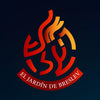
"Parasha Shemini" (Vayikra -Levitico 9.1–11, 47)
In one of the most eagerly awaited, anticipated, and spectacular moments of Chumash, after months and months of preparation and hard work, the Mishkan is completed. Moses performs the sacred service of its inauguration for seven days, so that the family of Kohanim can learn and assume this great responsibility. At its culmination on the eighth day, his older brother Aharon, in an act of passing on the priesthood, humbly performs all the rites and special sacrifices of the day, and as the pasuk says, still atop the great altar, he decides to bless the entire people.
What did he say at that momentous moment? The great commentator Rashi informs us that he requested the famous blessing of the Kohanim at that very moment. The problem is that this phrase appears much later in the Torah, in Parashat Naso, as the Ramban comments. Why not think that it occurred to Aaron to say something personal, as Shlomo Hamelech expressed at the completion of the construction of the First Temple? Why was this sequence of blessings especially appropriate for the occasion?
Broadly speaking, this tripartite blessing contains a message that is profoundly relevant for that time and for all subsequent generations of Am Israel.
The first verse speaks of the blessing of sustenance and material abundance when it says and God. The second refers to Hashem's blessing of spiritual enlightenment when he says God and God. And the third refers to Shalom God God .
The concept of the number three in Judaism is very significant as the reconciler, and here the blessing of the material mentioned in the first verse and the spiritual represented in the second, always need to be balanced by the whole meaning contained in the concept of Shalom. After having felt the overwhelming power of his first experience making the avodah (service) in the Mishkan, Aharon the Kohen intuitively saw the importance of this balance, of walking humbly before Hashem in His Way, and imparted his vision to the People.
The Shechinah was indeed witnessed on that great day by the manifestation of the miraculous fire, the Esh (fire), on the altar, but this same fire was also manifested by the tragic consumption of Aaron's two sons for approaching the Mishkan improperly. What the father intuited about the importance of not being presumptuous before Hashem and his fear of the consequences of one's opposition, unfortunately materialized immediately with his sons. Clearly when one approaches the kedushah and spiritually we must demonstrate a great balance between our aspirations for holiness and the context in which we find ourselves.
Let us always remember what the prophet Micah says: “Hashem has told you what is good and what Hashem requires of you; only to do justice, to love kindness, and to walk humbly with your God…”
(From the Rabbi Avi Horowitz)
For the elevation of the soul of Bertha bat Simja (FEliza). and for the healing of all the sick in Am Israel and the world.
The Breslev Garden recommends:
